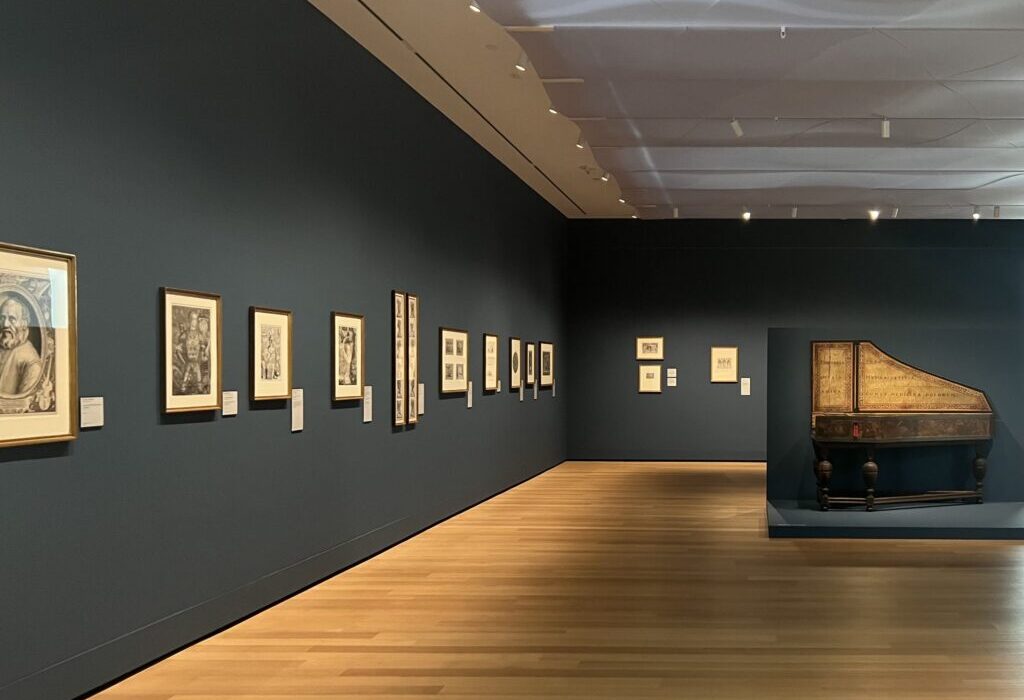The Yale University Art Gallery introduced its newest exhibition, “Ornament,” to highlight the translation and adaptation of visual decoration in ancient European media.
Davianna Inirio
3:42 am, Oct 06, 2023

Davianna Inirio, Contributing Photographer
On the dim blue walls of the Yale University Art Gallery’s newest exhibition are framed prints with curves and fine details that draw the viewers’ eyes from corner to corner.
“Ornament” opened on the YUAG’s fourth floor Sept. 26 and displays various art prints from primarily 16th-to-19th-century Western Europe. The exhibition also represents a new collaboration between the YUAG and the School of Music. The Morris Steinert Collection of Musical Instruments, which is temporarily closed right now, has adorned the gallery space with three different piano pieces, two in the center of the room and one in a corner.
“The idea is that we installed a selection of prints around the three instruments to highlight not the functionality of the playing instruments, but the decoration of the instruments as furniture,” said Laurence Kanter, chief curator and curator of European art.
“Ornament” aims to demonstrate the impact of ornamentation as decorum among European cultural media, according to the wall text in the gallery — the decoration has been an arena for artists throughout history to hone their artistic license.
These exaggerated curves or fantastical forms are then translated from one context to another through history, and help display the longevity of ornamentation, the text continues.
“I became fascinated with the notion that the incredibly sophisticated Western European vocabulary for ornament relies on forms and motifs that were first uncovered in the early fifteenth century in the Domus Aurea, or pleasure palace of Emperor Nero in Rome,” said Freyda Spira, the YUAG’s curator of prints and drawings.
Spira was tasked with sourcing the prints and drawings that line the walls, and Kanter sourced the three key instruments that the prints and drawings frame.
The collaboration between both curators was an effort to bring to life a partnership between the School of Music and the visual arts at YUAG — an opportunity to showcase artworks never seen or appreciated for their ornate decoration.
“It is something that music specialists rarely pay attention to and furniture or architecture or painting specialists rarely have access to,” said Kanter.
Kanter added that these instruments are usually kept separate from art museums, so this was an opportunity to “bring the two worlds closer together.”
The YUAG’s effort to bring attention to these fantastical visuals and decorum has intrigued students and faculty to visit but has yet to reach wider audiences.
“I went to the art gallery last week and even talked with some employees,” said Andrea Necoechea ’27. “No one mentioned anything about the exhibition.” She added that she would love to see it, despite the lack of awareness of the exhibition.
Undergraduate and graduate art professors share a similar sentiment regarding the push for more outreach for the exhibition.
Maria de Los Angeles, critic and assistant director of painting and printmaking at the School of Art and professor for “Painting Basics,” suggested that the YUAG expand its outreach by extending more invitations for upcoming exhibitions to centers across the University.
However, Kanter said the exhibit was planned on very “short notice.”
“We have publicized it but only over the past few weeks,” he said. “That may possibly account for its low profile.”
Ornament is currently open to the public until Feb. 24, 2024.

